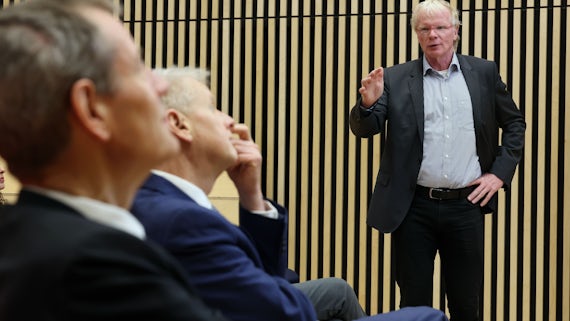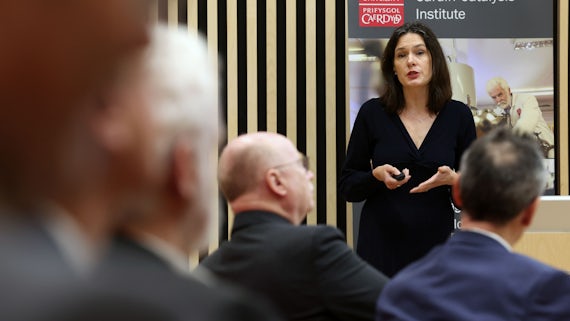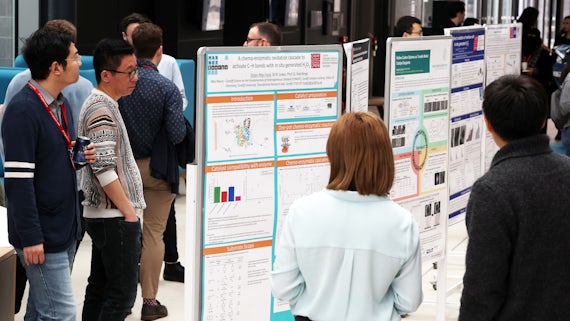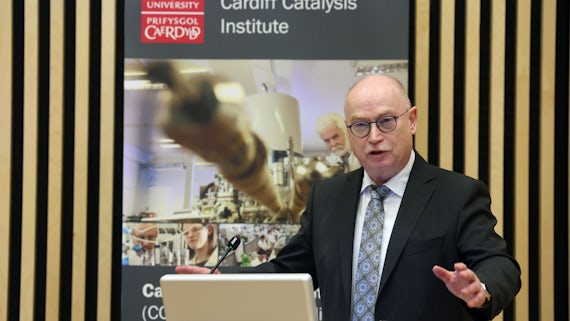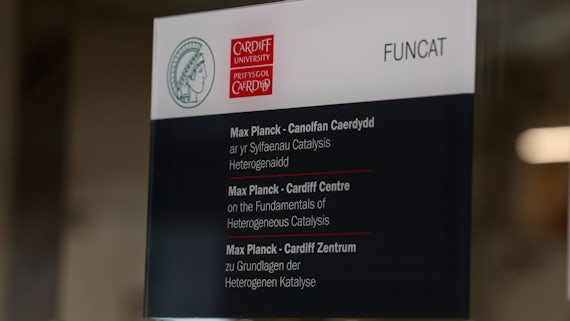Launch of new centre showcases innovations in catalysis research
29 March 2023
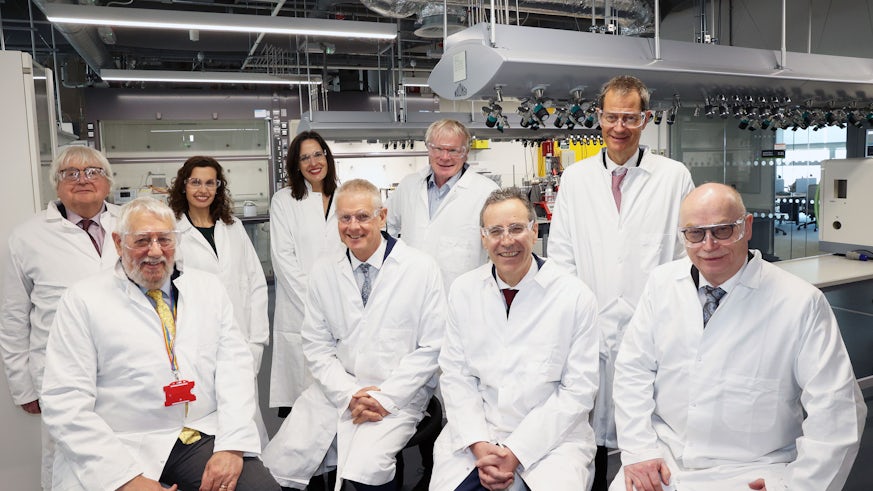
The scientific developments needed to achieve net zero greenhouse gas emissions in the chemical industries are possible with innovative catalysis research, leading scientists claim.
Speaking at the launch of the Max Planck Centre on the Fundamentals of Heterogeneous Catalysis (MPC FUNCAT) based at Cardiff University, researchers from across the UK and Europe said their work was a key contributor in the quest for a cleaner, greener planet.
MPC FUNCAT brings together world-leading expertise from the Cardiff Catalysis Institute with the Max Planck Institute for Chemical Energy Conversion, the Fritz Haber Institute of the Max Planck Society and the Max-Planck-Institut für Kohlenforschung.
Together they aim to improve the understanding of catalysis, develop new catalytic processes with industry, and promote the use of catalysis as a sustainable 21st century technology.
Professor Graham Hutchings, Regius Professor of Chemistry at Cardiff University and one of the centre’s co-directors, said: "The future of catalysis research will rely heavily on the link between theory and experiment with our theoretical methods becoming increasingly predictive through innovations in artificial intelligence and big data.

This new approach to catalyst design will enable the drive for future economic development once again, this time in the direction of a climate-neutral economy, as we search for catalysts that convert CO2 into methanol, which can be used as a fuel. Such a catalyst could help meet the demand for synthetic fuels and the move toward a circular economy in chemical production while reducing the CO2 footprint.

The launch, which was originally scheduled for 2020 but delayed due to the COVID-19 pandemic, showcased the collaborative research already underway in carbon dioxide reduction, water electrolysis, hydrogen peroxide synthesis, ammonia synthesis, acetylene chemistry, mechanochemistry, and bimetallic particles.
Professor Colin Riordan, Vice-Chancellor of Cardiff University who attended the launch event, said: "Being a partner in the Max Planck Centre is exceptionally important for Cardiff University and a culmination of our successes and achievements in catalysis research dating back to 1997 when Professor Hutchings arrived in Cardiff.
The partnership is also crucial for science across Wales, the UK and Europe. Indeed, it’s a testament to the value of research collaboration post-Brexit, bringing together excellence in heterogeneous catalysis across four internationally outstanding research centres at home and abroad. I am excited to learn of the new discoveries that will be made.

As part of the launch, delegates including German Ambassador to the UK Miguel Berger, toured Cardiff University’s new Translational Research Hub (TRH).
The bespoke facility offers laboratories and meeting and office spaces to foster industry-academic partnerships that drive innovation and the University’s net zero goals for the sciences of catalysis and compound semiconductors.
Professor Hutchings added: "The official launch of the Max Planck Centre on the Fundamentals of Heterogeneous Catalysis comes at an exciting time for catalysis research at Cardiff University.
"The partnership and move to state-of-the-art facilities in the TRH herald new opportunities for us to further develop safe, sustainable, commercial catalysts with new applications."
MPC FUNCAT will share infrastructure, materials, and research equipment, supporting each institution’s transition to sustainability.
Professor Serena DeBeer, Director of the Max Planck Institute for Chemical Energy Conversion, said: "MPC FUNCAT provides a unique opportunity to enable new synergies between leading groups in catalysis research.
"It is clear that moving towards a sustainable future requires creative solutions in catalysis, which include not only heterogeneous catalytic processes, but also the incorporation of key reactivity features from homogeneous and biological catalysts.
"FUNCAT brings together a wide range of expertise in both theory and experiment, to push forward our fundamental understanding of chemical transformations and to move close to the goal of rational catalytic design."
Ferdi Schüth, Director at the Max-Planck-Institut für Kohlenforschung, added: "Here, four top laboratories are entering into an institutional partnership to join their resources and take an innovative approach to catalysis research.
"By doing so, we’re ultimately striving for a rational catalyst design."
Since its establishment in 1948, no fewer than 18 Nobel laureates have emerged from the ranks of the Max Planck Society, putting it on a par with the best and most prestigious research institutions worldwide.
Max Planck Centres are a central element of the Society’s internationalisation strategy.
Max Planck President Martin Stratmann, said: "Catalysis research makes a crucial contribution to energy conversion and storage, but more generally to socioeconomic development, especially towards a circular economy.
"There are still many fundamental questions here that the Max Planck Centre at Cardiff University will help to answer."
Share this story
Discover how our innovative research impacts the world.
